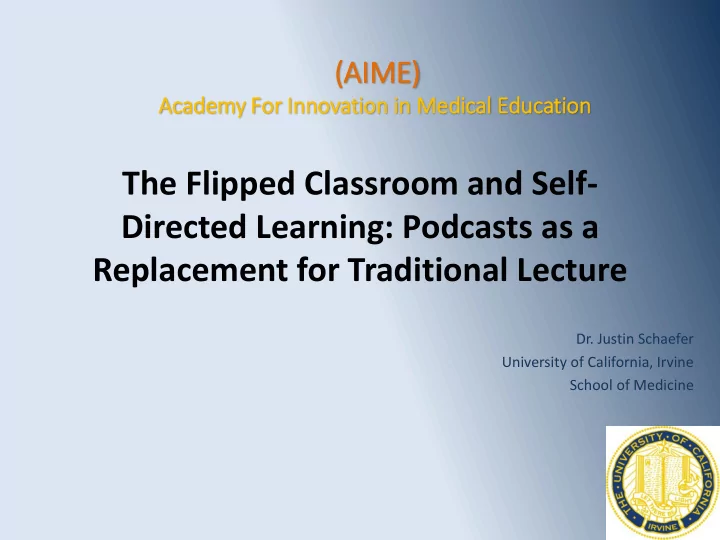

(AIME) Ac Academy For In Innovation in in Med edical l Education The Flipped Classroom and Self- Directed Learning: Podcasts as a Replacement for Traditional Lecture Dr. Justin Schaefer University of California, Irvine School of Medicine
• Replaced traditional, hour-long lectures with sets of podcasts • Each 1 hour lecture slot results in 3-4 podcasts of ~15min • Every 2-3 lectures, a previously scheduled lecture hour is used to hold a Q&A session with the professors • Only a potion of the lectures are podcasted this year • TBD if we do the rest
• Student interest: • Time flexibility for studying • Higher resolution allows for smaller figures/text: more information per slide • Maintains narrative • Professorial curiosity: • Initial time investment (making podscasts), later time returns (no lecturing needed) • Maximize teaching resources, methods and technologies with which the students are familiar and comfortable • Allows meetings to focus on a discussion of the material as opposed to delivering material
• Experiment • 1st year medical students • Histology course • Highly visually oriented • Ability to stop and view slides at a premium • No lab section (this is not a change from the original course) • Results • Positive feedback • Test scores seem to be on target • Conflated with traditional lectures
• The anatomy of a successful podcast: • Maintain cohesion throughout lectures • Intra- and inter-lecture • Must keep student’s interest • Shorter • More dynamic • Multiple avenues of engagement • Draw attention to specific places using motion and color change • Keep slides simple (or at least navigable)
• Issues • Printing presentation • Oration not engaging enough/too fast • Provide transcript/outline • Students that insist they learn more effectively via traditional lectures • The Slippery Slope • Will podcasts eventually take the place of the lecture hall, obviating the need for instructors? • Not with Q&A sessions, where their expertise is still necessary
• Powerpoint • • Animation/selection panes Handbrake • • Edit points Changing formats • • Recording Compressing files • Camtasia • Sound mixing • Recording screencaptures
• Headset • Mic gives better sound quality • Replay is high fidelity, so you can tell if there is a problem with tone or background noise • Webcam • Recording yourself for demonstrations or picture-in-picture • Graphics tablet • Better control for on-screen drawing (once the learning curve is surmounted)
• Dynamic text/figures/animations • Allows pictorial descriptions of difficult concepts • Example
• Epidermis (epithelium) • stratified squamous epithelium • keratinized, non-vascularized
• Epidermis (epithelium) • Dermis (mostly connective tissue) • Two sublayers: Papillary and reticular • Mostly connective tissue //capillaries. • Presence of specialized sensory receptors • Skin appendages such as hair follicles, sebaceous glands and sweat glands in deeper dermis
• Epidermis (epithelium) • Dermis (mostly connective tissue) • Hypodermis (superficial fascia of gross anatomy): • Technically not a part of skin, but hair follicles, sweat glands and sensory receptors associated with skin are found there • Loose connective tissue with varying amounts of fat
• Animation can provide a seamless context for information without the use of multiple slides and disjointed oratory
• Higher resolution allows real-time comparison between multiple sources during narration
1. Single layer of column-shaped cells 2. Often have microvilli or cilia at • Utilizing the ability to stop at any apical surface. time as a teaching tool • Self-test slides
• Mandatory • A 5- 6 slide “self - assessment” is given • Not graded • Board-type and practical questions • Instant feedback • Previous material is opened up for discussion • Extra time is used for review, quizzing or skills practice
• In short, it appears that podcasts The integral part to this format can be used as effective teaching is the didactic Q&A session platforms for many situations. that allows students to interact with the professors Some important ideas and • caveats: Further study is necessary to discern the effectiveness of • The main attraction to this style of teaching. Test students is the ability to performance will decide the manage time fate of this technique • Must be short • Must be navigable • Must be cohesive • PowerPoint is an extremely powerful and flexible tool, but can be enhanced by other programs
For any questions, please contact me: jschaefe@hs.uci.edu
ciliary process • Ciliary processes • Pars ciliaris of the retina • Non-pigmented ciliary epithelium • Pigmented ciliary epithelium Non- Pigmented Pars ciliaris pigmented ciliary of the retina ciliary epithelium epithelium zonule fibers Walk through scales when necessary
• Extension from ciliary body, Connective divides anterior and posterior tissue chambers • Sphincter Outlines pupil pupilae • Consists of: • Loose, vascular Dilator connective tissue rich in pupilae melanocytes and fibroblasts Pigmented • Contains radially epithelium oriented myoepithelial cells: dilates pupil • Antagonistic muscles are circumferentially Connective oriented (sphincter) tissue smooth muscle; constricts pupil Sphincter • Posterior surface is covered by pupilae pigmented epithelium Dilator Couple anatomical pupilae illustrations with histo – Pigmented alsways orient to scale Lens epithelium
1. Single layer of column-shaped cells 2. Often have microvilli or cilia at apical surface.
• When the ciliary muscle relaxes, tension on the zonule fibers stretches and flattens the lens, allowing the eye to focus at distance • When the ciliary muscle contracts, tension on the zonule fibers is relieved, allowing the lens to become more round and permitting focus on near objects Zonular fibers (suspensory ligaments) Use animations to demonstrate difficult descriptions
Recommend
More recommend